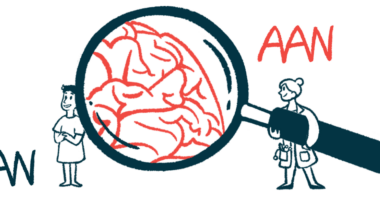Ultomiris approved in Japan for AQP4-positive NMOSD
Regulatory reviews are ongoing in US and other countries

Ultomiris (ravulizumab) has been approved by authorities in Japan to prevent relapses in adults with neuromyelitis optica spectrum disorder (NMOSD) positive for antibodies against aquaporin-4 (AQP4).
The decision from the Japanese Ministry of Health, Labour and Welfare comes shortly after a similar approval by the European Commission, making Ultomiris the first and only long-acting C5 complement inhibitor approved for this indication.
Regulatory reviews are ongoing in the U.S. and other countries.
Ultomiris is the successor of Soliris (eculizumab), an older C5 complement inhibitor therapy approved for NMOSD that was also developed by Alexion Pharmaceuticals — now a subsidiary of AstraZeneca known as Alexion, AstraZeneca Rare Disease.
“Alexion transformed the NMOSD landscape by uncovering the exceptional efficacy of C5 complement inhibition in reducing the risk of relapses for patients,” Marc Dunoyer, CEO of Alexion, said in a company press release.
‘Convenient dosing every eight weeks’
“With today’s approval, we continue to deliver on our commitment to the NMOSD community, offering patients an innovative long-acting treatment option that has the potential to eliminate relapses with convenient dosing every eight weeks,” Dunoyer added.
NMOSD is caused by the immune system’s mistaken attack on components of the nervous system, particularly the spinal cord and optic nerve that transmits signals between the eyes and the brain.
For most patients, the self-reactive antibodies that drive these autoimmune attacks are targeted against AQP4, a protein found on nerve support cells called astrocytes.
Symptom flares, or relapses, are usually interspersed with periods of recovery, or remission. Still, these relapses can lead to progressive and permanent disability, causing patients to lose their vision or become wheelchair-bound.
“As a single NMOSD relapse can result in long-term and life-altering disability, relapse prevention is the primary treatment goal in this disease and essential to help patients maintain quality of life,” said Ichiro Nakashima, MD, PhD, professor of neurology at Tohoku Medical and Pharmaceutical University in Japan.
The approval of this long-acting C5 complement inhibitor in Japan is a significant advance for patients with [anti-AQP4 antibody-positive] NMOSD, offering dosing every eight weeks and the potential to live relapse-free.
Ultomiris approved in Japan, Europe, and US for other diseases
Ultomiris is an into-the-vein therapy designed to block C5, a key protein in the immune complement cascade that’s involved in driving the autoimmune attacks that characterize NMOSD. It acts essentially in the same way as Soliris, an approved NMOSD therapy for patients with anti-AQP4 antibodies.
While both medications are delivered via direct infusion into the bloodstream, Ultomiris was designed to be more stable than Soliris, allowing it to be dosed less frequently — once every eight weeks after a loading dose compared with every other week for Soliris.
Ultomiris is already approved in Japan, Europe, and the U.S. for other diseases in which the complement cascade is overactive, including generalized myasthenia gravis, atypical hemolytic uremic syndrome, and paroxysmal nocturnal hemoglobinuria.
Its recent approvals for NMOSD were backed by results from a global Phase 3 clinical trial, called CHAMPION-NMOSD (NCT04201262).
A total of 58 adults with AQP4-associated NMOSD were enrolled and treated with Ultomiris for at least 50 weeks (or about 11.5 months) in the main treatment period, and then were able to enter an open-label extension phase, where all are continuing to be treated for up to an additional two years.
The main goal of the trial was to compare the time to first relapse among CHAMPION-NMOSD participants with that of 47 patients given a placebo in a prior Soliris trial, dubbed PREVENT (NCT01892345).
No relapses observed in Ultomiris-treated patients over 1.5 years
That goal was met, with no relapses observed in any Ultomiris-treated patient over a median treatment duration of 73 weeks (nearly 1.5 years). That corresponded to a 98.6% reduction in relapse risk relative to the external placebo group, where 42.6% of patients had a relapse over a median eight months of follow-up.
This difference has continued to be sustained through a median of 90 weeks (about 1.7 years), according to the company.
The safety and tolerability of Ultomiris in CHAMPION-NMOSD was consistent with that reported in previous trials and with real-world use. Common side effects included headache, back pain, joint pain, and urinary tract infection.
COVID-19 infections were also common but were deemed unrelated to Ultomiris treatment.
“With no relapses observed in the pivotal CHAMPION-NMOSD trial, the approval of this long-acting C5 complement inhibitor in Japan is a significant advance for patients with [anti-AQP4 antibody-positive] NMOSD, offering dosing every eight weeks and the potential to live relapse-free,” Nakashima said.








